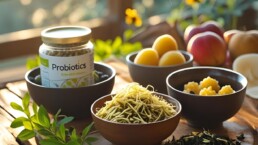Peptic ulcers are like open sores in the stomach or duodenum. They’re often caused by the H. pylori bacteria. Taking pain meds for a long time can also lead to ulcers. In India, many people look for natural ways to help heal these ulcers. In this article, we’ll look at some proven natural remedies for peptic ulcer disease.
Table of Contents
ToggleUnderstanding Peptic Ulcer Disease
Peptic ulcers are sores in the stomach’s or the duodenum’s lining. They are very painful. Knowing what causes them helps us take care of our health better.
What is a Peptic Ulcer?
A peptic ulcer is a hole in the stomach or duodenum lining. This protective layer usually keeps us safe from stomach acid. But, if it gets damaged, acid can hurt the tissue, causing an ulcer.
Common Causes of Peptic Ulcers
A bacteria called Helicobacter pylori (H. pylori) is the top culprit. It weakens the stomach’s protective lining. This makes the stomach more easily harmed by its own acid.
Long-term use of certain pain medications can also lead to ulcers. This includes aspirin and ibuprofen. They can irritate the stomach lining, causing ulcers to form.
Stress, smoking, and drinking too much alcohol can also play a part. Sometimes, other diseases like Zollinger-Ellison syndrome or Crohn’s can lead to ulcers.
Knowing what causes peptic ulcers is key to stopping them from coming back. By treating the root issues, we can heal and keep our stomachs healthy.
The Power of Flavonoids
Flavonoids are key in dealing with peptic ulcers from natural sources. They are in many fruits, veggies, and teas. These plant-based compounds help heal and prevent stomach and duodenal ulcers.
They are strong antioxidants, protecting the stomach’s lining. Flavonoids such as quercetin, rutin, and kaempferol are in these foods. These fight the harm from alcohol, NSAIDs, and Helicobacter pylori, a leading cause of ulcers.
Eating more foods with flavonoids is good for ulcer care. Good sources include:
- Soybeans and legumes
- Grapes, berries, and apples
- Leafy greens like kale and broccoli
- Teas, especially green tea
Adding flavonoid-rich foods to your diet boosts your body’s ulcer fight. So, use these plant wonders for better gut health.
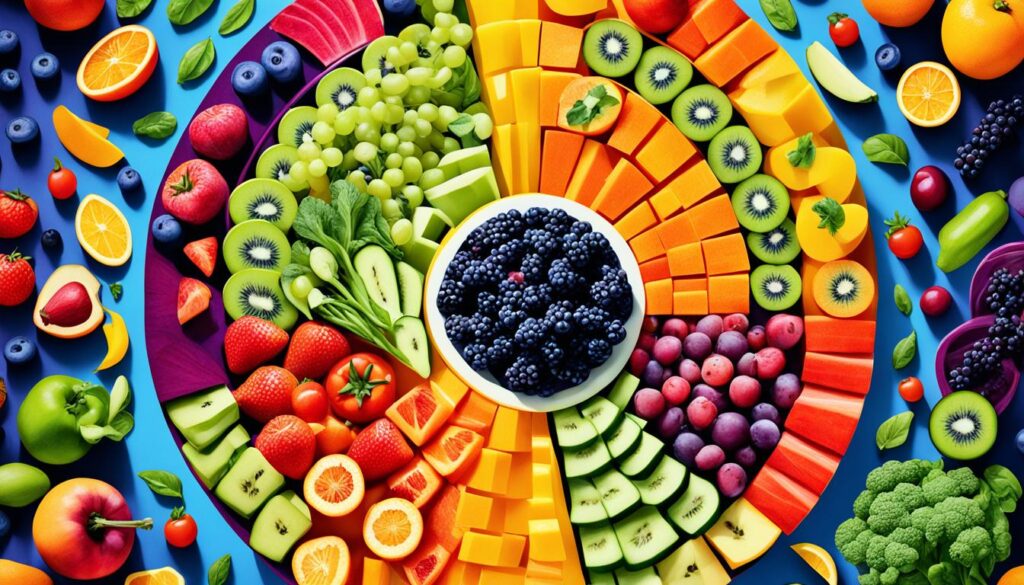
Aloe Vera: A Soothing Remedy
Aloe vera is a plant famous for its healing effect on the skin. It also seems to help with peptic ulcers, as some studies show. These studies found that using aloe vera might help ulcers heal faster and better.
The gel or juice from aloe vera can guard the stomach and aid in healing. This is because it fights inflammation and has antioxidants.
How Aloe Vera Helps Heal Ulcers
In 2016, a study found aloe vera is good for treating peptic ulcers. The researchers said it’s cheap and easy to find. This makes it a good choice for treating these ulcers. Aloe vera helps by:
- Reducing inflammation in the stomach lining
- Boosting protective mucus production
- Improving the work of antioxidants
- Stopping the bad bacteria, Helicobacter pylori, from growing
Drinking aloe vera juice or using the gel can make peptic ulcers feel better. Talk to your doctor about adding aloe vera to your medicine plan.
Licorice: An Ancient Ulcer Treatment
Licorice has help treat stomach problems for a long time, way back in history. DGL, or deglycyrrhizinated licorice, is a form of licorice that might be good for ulcers. It has the sweet part removed. This might make more slime in the stomach. More slime means the stomach’s surface can be protected better. Then, ulcers can get better by themselves.
For many years, people have used licorice for ulcers. It seems to fight a bad bug called Helicobacter pylori. This bug can cause ulcers. Also, licorice can make swelling and pain around ulcers get less. That can help them heal faster.
We still need to learn more about how good licorice really is for ulcers. It might be good, but we’re not sure yet. If you’re thinking of using it, talk to your doctor first. Too much licorice could cause problems like high blood pressure or keeping too much water.
To wrap it up, people have used licorice for ulcers for a really long time. But we still need to check if it really works. A kind without the sweet part, DGL, might be better. But, always talk to your doctor before trying it or any other natural treatments for ulcers.
Probiotics: Restoring Gut Balance
Probiotics are natural helpers for peptic ulcers. People who use them see better recovery. This is from studies on the good bacteria in probiotics.
Fermented foods are a great source of probiotics. This includes yogurt, kombucha, miso, kimchi, and kefir. They are also in probiotic supplements. Probiotics don’t kill H. pylori directly. But, they do help the gut balance, lower inflammation, and heal faster when used with other medicines.
Probiotic-Rich Foods and Supplements
Eating more probiotic-rich foods might help with peptic ulcers. Try adding these foods to your meals:
- Yogurt (plain, unsweetened)
- Kefir
- Sauerkraut
- Kimchi
- Miso
- Tempeh
- Kombucha
If you don’t like these foods, a supplement can help. Find one with many strains like Lactobacillus and Bifidobacterium. These are good for your gut health.
Eating more probiotics may help heal peptic ulcers by supporting good gut bacteria. Talk to your doctor to find what’s best for you.
The Benefits of Honey
Honey is a natural sweetener. It might help people with peptic ulcers. It is full of good things, like antioxidants and stuff that fights germs. This makes it great for those with stomach problems.
Honey can stop bad bacteria, like Helicobacter pylori, from growing. It has special powers that fight this harmful germ. Because of this, it can help prevent and heal ulcers.
Not just that, honey can also help heal wounds, including ulcers. Its antioxidants, like polyphenols, calm and restore your gut. This helps it heal faster.
Adding honey to what you eat can be tasty and good for you. If your blood sugar is okay, use it in teas, smoothies, or on healthy foods. It’s a nice and natural way to get better.
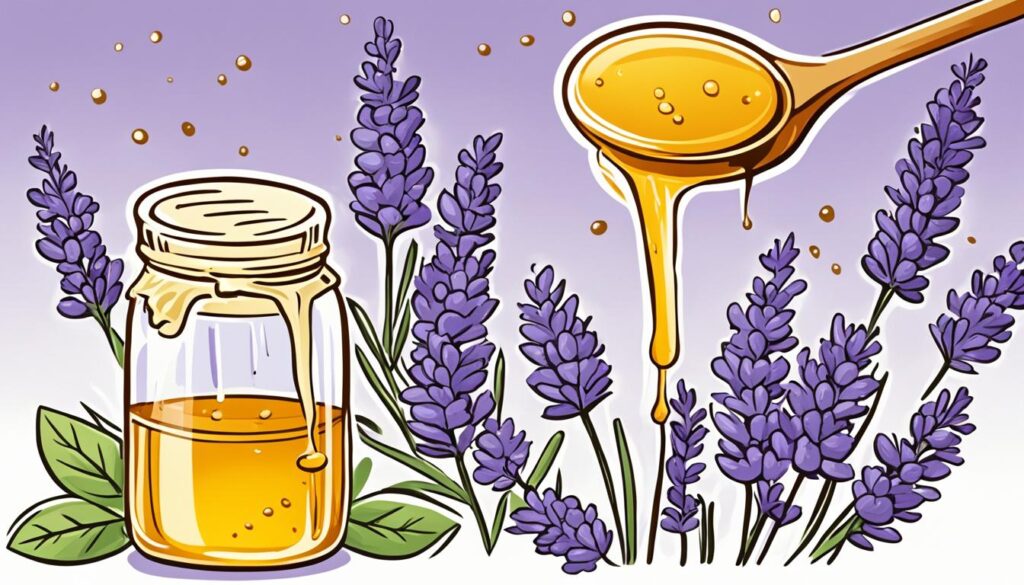
Honey is a cool natural way to deal with ulcers. It has special powers that help fight germs and make your body stronger. So, adding honey to your life is a sweet move for better digestive health.
Cranberry: A Natural Antibacterial
Cranberry has long been known for its good effects on health. Now, research shows it might help fight peptic ulcers. These ulcers are often caused by the Helicobacter pylori (H. pylori) bacteria.
Drinking cranberry juice with lots of proanthocyanidins (PACs) can help. A study found a 20% drop in H. pylori infection after eight weeks. Over 80% of people in some places around the world have H. pylori.
Cranberry stops H. pylori from sticking to the stomach. More PACs in cranberry juice mean better help against H. pylori. This shows how the parts of cranberry can fight ulcers well.
To use cranberry to prevent ulcers, choose unsweetened juice, fresh berries, or good supplements. Stay away from super sweet juices. They may not help because of added sugar. You can also use aloe vera, licorice, and probiotics with cranberry for better gut health.
Using cranberry for ulcers might help. But, talk to your doctor first. This is especially important if you take medicine or have other health problems. The right mix of treatments can help heal ulcers better.
Polyphenol-Rich Foods for Ulcer Healing
Peptic ulcers can hurt a lot, but you can eat certain foods to help you heal. Many fruits, vegetables, and whole grains have lots of polyphenols. These are special antioxidants that help your body heal from ulcers.
Polyphenols protect your stomach lining. They make existing ulcers heal better too. Studies show polyphenols reduce inflammation, stop bad bacteria growth, and increase stomach mucus.
Adding these top polyphenol foods to your meals can be great for ulcer healing:
- Dried rosemary
- Flaxseed
- Dark chocolate
- Berries (like blueberries, raspberries, and blackberries)
- Black olives
These foods fight off bad free radicals and help your body heal. Eating polyphenol-rich foods often might help you recover from ulcers faster. It may also lower your discomfort.
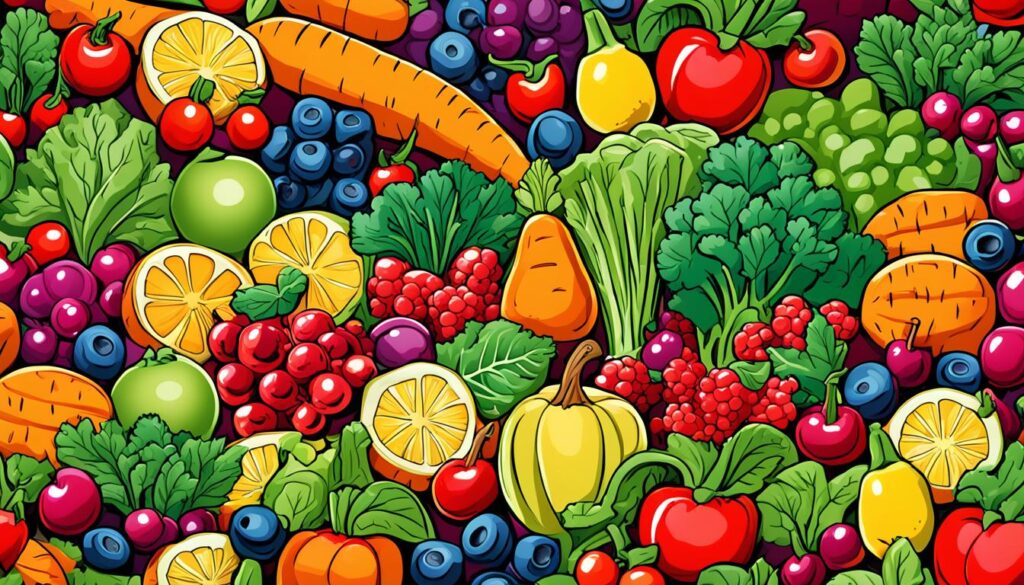
Even though the right diet is key, it’s best to also work with your doctor for ulcer care. They’ll help create a plan that mixes diet changes with medicine or other treatments. This combined effort will guide you to better digestive health.
Natural Remedies peptic ulcer disease
Besides medicine, some natural ways can help peptic ulcers. Eating foods like aloe vera and licorice can be good. So can flavonoids, probiotics, honey, and foods with many antioxidants.
Flavonoids, found in cherries and apples, are great. They can fight off Helicobacter pylori, a cause of ulcers.
Folks have used aloe vera for ulcers for a long time. It’s good at reducing swelling and kickstarting healing.
Licorice also helps by making more stomach lining. This lining keeps the stomach safe while an ulcer heals.
- Probiotics: Eating foods with good bacteria like yogurt may stop ulcers from coming back.
- Honey: It stops bacteria from growing and helps heal wounds. This makes it a good addition for ulcer care.
- Cranberry: It fights off harmful bacteria, which is good for peptic ulcer healing.
- Polyphenol-rich foods: Green tea and ginger can help by reducing inflammation in the stomach.
Remember, always talk to your doctor before trying any of these. They can help your healing but not alone. They go with regular treatments.
Dietary Considerations for Ulcer Management
Changing your diet can really help with ulcer care. Some foods and drinks can make ulcers worse by letting stomach acid flow back. This can hurt your stomach more.
Foods to Limit or Avoid
Be careful about what you eat or drink to control your peptic ulcers. Think about cutting back on these items to feel better:
- Coffee
- Carbonated drinks
- Alcohol
- Chocolate
- Spicy foods
- Processed foods
- Acidic foods like citrus and tomatoes
Writing down what you eat can show which foods make you feel worse. This can help you pick the best foods and drinks for diet for peptic ulcers. Then, you’ll start to feel well again.
Finding the right foods and drinks for you with ulcers is important. But, not all food advice is the same. Your doctor can help you make a plan that is right just for you.

Garlic: A Powerful Antimicrobial
Garlic is not just tasty; it could help with peptic ulcers. This plant is strong against germs and bacteria. That makes it good for fighting Helicobacter pylori (H. pylori). These bacteria often cause peptic ulcers.
H. pylori infection is common, affecting many people. In some places, 70-90% of folks might have it. Yet, the usual treatment doesn’t always work well. But, garlic’s power might be a game-changer here.
Some animal studies suggest garlic can stop ulcers and help them heal faster. More research is needed for humans. But, eating more garlic or taking supplements could help your gut stay healthy.
Giving up on chemical medicines, people often find garlic easier to use. It could be a great choice for anyone wanting a natural way to deal with peptic ulcers.
Apart from fighting off germs, garlic also kills bacteria. Its many health benefits could make garlic very useful for keeping your gut healthy. This includes fighting off H. pylori.
Turmeric: The Golden Spice for Ulcers
Turmeric is a bright yellow spice often used in Indian food. It’s becoming popular for fighting peptic ulcers. The key part of turmeric, called curcumin, is researched for helping heal ulcers. It has anti-inflammatory and antioxidant powers.
Curcumin’s Anti-Inflammatory Properties
Curcumin is turmeric’s main active part. It fights inflammation really well. This can help people with ulcers in their stomach or duodenum.
Studies show turmeric can protect and heal ulcers in rats. For example, a plant called Phyllanthus niruri, also known for fighting inflammation, has helped too.
One way turmeric helps is by fighting inflammation. It stops some harmful stuff and helps the body cope with others. This can protect against ulcers.
Also, some studies show curcumin in turmeric can protect the stomach in mice. This makes turmeric look like a good natural option for ulcers.
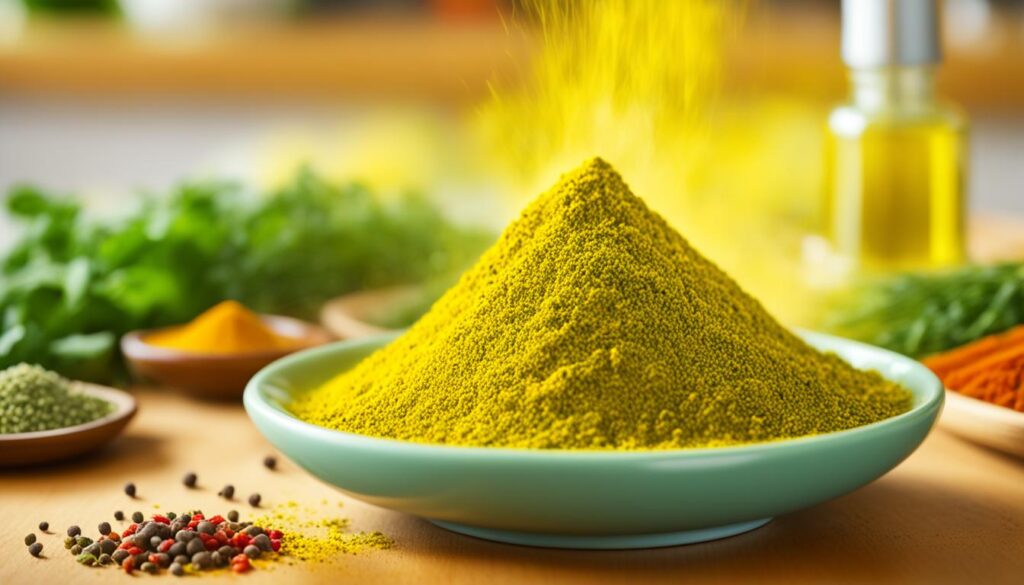
Over the last 25 years, there have been more than 3,000 reports about turmeric. It’s been used for almost 4,000 years. India makes most of the world’s turmeric and uses a lot of it. This shows how important turmeric is to India’s culture and economy.
Mastic Gum: An Ancient Mediterranean Remedy
Are you dealing with peptic ulcers? Think about trying something old but gold from the Mediterranean – mastic gum. It comes from the mastic tree and has been used for a long time in healing gut issues, like peptic ulcers.
Studies show that mastic gum might work well against ulcers. It seems to ease symptoms and help ulcers heal faster than doing nothing. Plus, mastic gum can fight the H. pylori bacteria, often found with peptic ulcers.
Using mastic gum might help with your peptic ulcers. Let’s see why this ancient Mediterranean treatment is worth looking into.
- A small 2010 study found that 19 out of 52 participants successfully cleared Helicobacter pylori infection after chewing mastic gum for two weeks.
- Those who took mastic gum along with an antibiotic had the best chances of getting rid of the H. pylori bacteria.
- More recent studies could help tell us more about mastic gum’s power against ulcer-causing bacteria.
Mastic gum might help not only with ulcers but also with other health issues. It’s been looked into for the following benefits:
- A 2015 review said that taking mastic gum helped reduce inflammation in people with IBD over four weeks.
- A 2016 study showed it could lower cholesterol and blood sugar in eight weeks.
- Another study from 2007 found that taking mastic gum reduced liver enzyme levels that show liver damage over 18 months.
Mastic gum looks like a good option for ulcers and general health. But, we still need more studies to know how well it works and the best amount to use. If you’re thinking about adding it to your treatment plan, talk to your doctor first.
Chili Peppers: Surprising Ulcer-Fighting Properties
Did you know, chili peppers might help stop and heal peptic ulcers? These spicy veggies have a thing called capsaicin. It can do a lot of good for people with stomach and duodenal ulcers.
Capsaicin is the special part in chili peppers. It helps lower how much stomach acid your body makes. This acid usually causes ulcers. Capsaicin also makes more blood flow and mucus in the stomach. This helps stop ulcers from starting.
Some research shows capsaicin fights inflammation and germs. These are big reasons why peptic ulcers happen, like from Helicobacter pylori infections. So, capsaicin can help heal old ulcers and stop new ones from coming.
Keep in mind, everyone’s different with how they handle spicy foods. But, eating some chili peppers might help with your ulcers. Even so, it’s smart to check with your doctor before eating more spicy foods. They’ll know if it’s a good idea for you.

In the end, chili peppers show how great natural ways can be. Thanks to capsaicin, we have this unexpected remedy for ulcers. Knowing this science can help you fight ulcers and make your gut stronger and healthier.
Conclusion
Many people worldwide get peptic ulcer disease. Mixing natural remedies with traditional medicines helps. This mix can heal and stop ulcers. Using things like flavonoids, aloe vera, and honey is good. So are garlic, turmeric, and mastic gum. They offer a whole-body way to treat ulcers. This approach looks at the main reasons behind your ulcer. It also offers long-term relief.
In 2015, there were around 87.4 million new cases of ulcers. Yet, the number of deaths dropped from 1990 to 2015. This shows that both new and old treatments work well together. By changing what you eat and how you live, and working with your doctor, you can feel better. Natural methods can boost your health. They can help you handle your stomach problems better.
Add natural ways to treat your ulcer but keep seeing your doctor. A mix of natural and medical care is best. It lets you enjoy the benefits of natural healing and healthcare. With both, you can manage and possibly end your ulcer problems.
FAQ
What is a peptic ulcer?
Peptic ulcers are sores in the stomach or duodenum. They’re also called stomach ulcers.
What are the common causes of peptic ulcers?
An infection with H. pylori bacteria is common. Long-term use of pain meds like aspirin can also cause them.
How can flavonoids help with peptic ulcers?
Flavonoids are in fruits and veggies. They have antioxidants that help heal peptic ulcers.
How does aloe vera benefit peptic ulcers?
Aloe vera can speed up wound healing. It does this because of its anti-inflammatory and antioxidant abilities.
What is the role of licorice in treating peptic ulcers?
Some use DGL for ulcers because it increases stomach mucus. This can protect the stomach’s lining.
How can probiotics help with peptic ulcers?
Probiotics improve recovery. They restore gut balance and help heal ulcers faster by reducing inflammation.
What are the benefits of honey for peptic ulcers?
Honey fights H. pylori and speeds up ulcer healing. It does this thanks to its antioxidants and wound-healing properties.
How can cranberry help with peptic ulcers?
Cranberry can fight H. pylori. It stops bacteria from sticking to the stomach lining.
What role do polyphenol-rich foods play in ulcer healing?
Foods rich in polyphenols can help heal ulcers. These include dark chocolate, berries, and olives.
What foods should I limit or avoid with peptic ulcers?
Avoid coffee, alcohol, and spicy foods. Also, stay away from processed and acidic foods. They make ulcer symptoms worse.
How can garlic and turmeric help with peptic ulcers?
Garlic fights H. pylori infections. Turmeric’s curcumin reduces inflammation and helps heal stomach ulcers.
What is the role of mastic gum in treating peptic ulcers?
Mastic gum is a strong natural remedy for ulcers. It reduces symptoms and heals ulcers faster than a placebo.
Can chili peppers actually help with peptic ulcers?
Yes, capsaicin in chili peppers can help. It reduces stomach acid and increases mucus production in the stomach.
Source Links

This article is medically reviewed by Dr. Chandril Chugh, Board-Certified Neurologist, providing expert insights and reliable health information.
Dr. Chandril Chugh is a U.S.-trained neurologist with over a decade of experience. Known for his compassionate care, he specializes in treating neurological conditions such as migraines, epilepsy, and Parkinson’s disease. Dr. Chugh is highly regarded for his patient-centered approach and dedication to providing personalized care.

